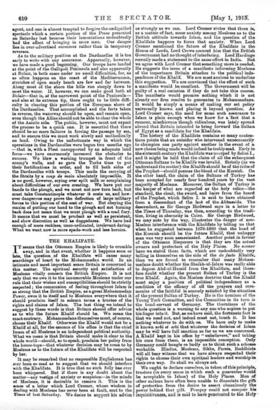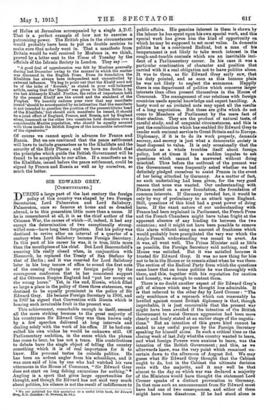THE inTitva - PATE.
IT seems that the Ottoman Empire is likely to crumble away, and in that event, whether it happens soon or late, the question of the Khalifate will cause many searchings of heart to the Mohammedan world. In an intimate and most important sense Britain is concerned in this matter. The spiritual security and satisfaction of Moslems vitally concern the British Empire. It is not only that we owe it. to the innumerable Moslems under our rule that their wishes and susceptibilities should be strictly respected ; the communion of feeling throughout Islam is so strong that the British Empire, as a great Mohammedan Power, owes it to itself and to Moslems everywhere that it should proclaim itself in solemn terms a trustee of the rights and claims of Islam. The last thing we intend to suggest by these words is that Britain should offer advice as to who the future Khalif should be. We mean the exact contrary. Mohammedans themselves must, of course, choose their Khalif. Otherwise the Khalif would not be a Khalif at all, for the essence of his office is that the chief Imam of all Moslems is an independent political authority. What we mean is that Britain should make it clear to the whole world—should, so to speak, proclaim her policy from the house-tops—that whatever decision may be come to by Moslems as to the future of the Khalifate will be respected by her.
It may be remarked that no responsible Englishman has aver been so mad as to suggest that we should interfere with the Khalifate. It is true that no such folly has ever been whispered. But if there is any doubt about the matter—any vestige of anxiety or suspicion—in the minds of Moslems, it is desirable to remove it. This is the sense of a letter which Lord Cromer, whose wisdom in dealing with Moslems has never been at fault, sent to the Times of last Saturday. We desire to support his advice
as strongly as we can. Lord Cromer states that there is, as a matter of fact, some anxiety among Moslems as to the British attitude towards Islam, and the question of the Khalifate happens to focus that anxiety. When Lord Cromer mentioned the future of the Khalifate in the House of Lords, Lord Crewe assured him that the British Government bad no thought of interfering. Lord Hardinge recently made a statement to the same effect in India. But we agree with Lord Cromer that something more is needed. He suggests the issue of a manifesto informing Moslems of the importance Britain attaches to the political inde- pendence of the Khalif. We are most anxious to underline this suggestion. We are convinced that the effect of such a manifesto would be excellent. The Government will be guilty of a real omission if they do not take this course. The manifesto would promise nothing which it is not already our firm resolve to guarantee to Mohammedans. It would be simply a means of making our set policy universally known and placing it beyond question. As Lord Cromer says, the need far some such assurance to Islam is plain enough when we know for a 'fact that a rumour, mischievous though ridiculous, was lately spread abroad that Britain intended to bring forward the Sultan of Egypt as a candidate for the Khalifate.
The history of the Khalifate contains so many conten- tious points that an outsider who intervened unnecessarily to champion one party against another in the event of a new choice being made would indeed be trebly mad. Early in the sixteenth century the Khalifate was usurped by Selim and it might be held that the claim of all the subsequent Ottoman Sultans to be Khalifs was invalid. Strictly (as we understand the matter) the Khalifs should be of the tribe of the Prophet—should possess the blood of the Koreish. On the other hand, the claim of the Sultans of Turkey has been accepted for nearly four hundred years by the vast majority of Moslems. Moreover, the Sultan of Turkey is the keeper of what are regarded as the holy relics—the standard, the cloak, the sword, and hairs from the beard of the Prophet, which Selim L is said to have obtained from a descendant of the last of the Abbassids. The descendant, as Sir George Birdwood says in a letter to the Times of Thursday, was then, according to the tradi- tion, living in obscurity in Cairo. Sir George Birdwood, we may note by the way, illustrates the danger of non- Moslem interference with the Khalifate by telling us that when be suggested between 1878-1880 that the head of the Koreish should be the future Khalif, that unhappy man wan very soon assassinated. Another point in favour of the Ottoman Emperors is that they are the actual owners and protectors of the Holy Places. No sooner have we stated these facts, which are undoubtedly very telling in themselves on the aide of the de facto Khalifs, than we are forced to remember that many Moham- medans doubt whether the Sheikh-ul-Islam was really able to depose Ablail-Hamid from the Khalifate, and these- fore doubt whether the present Sultan of Turkey is the true Khalif. Again, the Moslem doctrine that the Khalif must enjoy a position of political independence as a. condition of the efficacy of all the prayers and cere- monies of the faithful is scarcely satisfied by the situation of the present Sultan of Turkey. He is the nominee of the Young Turk Committee, and the Committee in its turn is the bond-servant of Germany. The thorniness of the whole question is a warning to any one who aspires to put his finger into it. But, se we have said, the fortunate fact is that we need not, and indeed must not, touch it. It has nothing whatever to do with us. We have only to make it known urld et orbi that whatever the decision of Islam may be will have full sanction so far as we are concerned. A Khalif kept in his office by" unbelievers," and taking his cues from them, is an impossible conception. Only Germany could bungle so badly as to think such a scheme workable. Hindus, Moslems, Sikhs, Penis, Buddhists will all bear witness that we have always respected their rights to choose their own spiritual leaders and worshipin their own way. So shall we always act.
We ought to declare ourselves, in token of this principle, trustees (in every sense in which such a guarantee would be acceptable to Islam) of the Holy Places. Men of other nations have often been unable to dissociate the gift of protection from the desire to assert obnoxiously the power behind that gift. Pompey could not conquer his
inquisitiveness, and is said to have penetrated to the Holy
of Holies at 'Jerusalem accompanied by a single A.D.C. That is a perfect example of how not to exercise a patronizing power. The British plan in the circumstances would probably have been to put on double sentries to make sure that nobody went in. That a manifesto from Britain would be well received by Moslems is, we think, proved by a letter sent to the Times of Tuesday by the officials of the Islamic Society in London. They say :— " A good deal of apprehension was felt by Muslims generally during last December owing to the manner in which the matter was discussed in the English Press. From its foundation the Khalifate has always been independent and uncontrolled by external influence. We beg to point out that the Khalif need not be of the tribe of ' Koreish,' as stated in your woll-balanced article, seeing that the ' Bayah ' was given to Sultan Solim I. by the last Abbaasyde Khalif. Further, the relics of importance held by the present Khalif axe the sword and the standard of the Prophet. We heartily endorse your view that any manifesto issued 'should be accompanied by an intimation that the manifesto is not intended to question the position of the present titular head of the Khalifate,' but should such manifesto be batted, it should be a joint effort of England, France, and Russia, not by England alone, inasmuch as the other two countries hold dominion over a considerable Muslim population, who should be equally assured with those inside the British Empire of the honourable intentions of the aignatoriea."
Of course we cannot speak in advance for France and Russia. But we are convinced that the peace settlement will have to include guarantees as to the Khalifate and the security of the Holy Places ; and we have no doubt that the principles which guide the British Government will be found to be acceptable to our allies. If a manifesto as to the Khalifate, issued before the peace settlement, could be signed by France and Russia as well as by ourselves, so much the better,



































 Previous page
Previous page